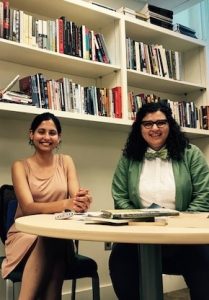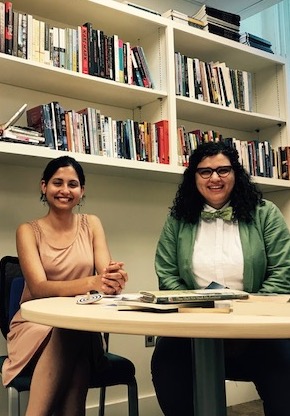
In each issue of Keywords, we profile a faculty member who makes innovative use of the library and/or academic technology. This issue features Dima Ayoub, Assistant Professor of Arabic.
Areas of Expertise: Translation studies, Arabic literature, postcolonial theory, gender studies
Secret Talents: Grammar-buff, cooking for big crowds, DJ-ing
Courses Taught: Modern Arabic Literature in Translation, Theory and Practice of Translation, Arab Cinema, all levels of Arabic language
How long have you been here?
I joined the Arabic Department in Fall 2016.
Where do you come from and what were you doing there?
I was previously at Georgetown University teaching in the Arabic and Islamic studies department.
What’s your favorite thing about this Middlebury?
The mountain views never get old.
What are 5 things that non-Arabic speakers typically don’t know about the Arabic language?
- The word i‘rāb which refers to a system of nominal, adjectival, and verbal case endings literally means to make a word Arabic.
- One of the most influential linguists and grammarians of Arabic is not an Arab!
- Arabic words commonly begin with a consonant letter.
- While there are 28 letters in Arabic, there are only 3 vowels.
- The most common numeral system in the world derives from the Arabic numeral system.
How do you use the library and how do our resources help you with your research?
To begin with, I love libraries. My favorite thing to do once I’ve located a text in the stacks is to peruse the books on either side. I enjoy having a sense of a book’s textual neighbors and like to imagine each shelf as a community of ideas. When I arrived at Middlebury, I was impressed with the extensiveness of the Arabic language collection that the library holds as well as a vast array of translations of Arabic literatures. It is tremendously helpful to have such a range of resources at my fingertips. This has been especially helpful for my DLA project.
What do you do with the Digital Liberal Arts (DLA) initiative. How do students help you in your efforts?
Through the DLA at Midd, I am expanding a database on paratexts of Arabic literature in translation that I created while writing my PhD dissertation. The DLA has been extremely helpful in introducing me to the myriad possibilities of digital collecting and archiving and its potential in advancing my research. Students are an integral part of the process, especially in collecting metadata and ensuring that it is entered and categorized properly. Through the DLA and their assistance in navigating OCR (Optical Character Recognition) systems, I am now able to convert my PDF files into machine readable texts – a process that will make my database searchable and easier to excavate.
What do you mean by “paratexts”? Why do they matter for your work?
Paratexts include such things as translator forewords, introductions or glossaries and are parts of a text that are often not included in textual analysis. I am interested in what happens when we consider paratexts as playing a role in how we read literature.
When will you consider your DLA project to be successful?
Once the database goes public.
Where can we find you on campus?
I am in the library quite a bit. If I’m not in my office in Voter Hall, I can often be found at Wilson Café chatting with students or grading.
